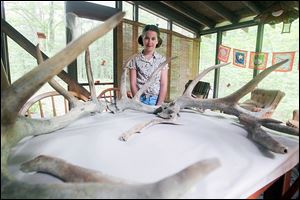
OUTDOORS
Michigan girl, 10, constructs science project with extinct elk
8/15/2014

TRAVERSE CITY, Mich. — It was supposed to be the first significant outing of the late-developing spring, when the ice had not yet unconditionally surrendered its shrink-wrap shroud over the lake, but avenues of open water made careful navigation possible.
So, with paddles in the water, Sonja Moehle and her father kayaked on a remote lake near here until they unwittingly passed through an invisible portal and into Michigan’s wildlife history.
The home-schooled 10-year-old, already gifted with a penchant for science, would soon be discussing DNA with professors at the University of Michigan, conferring with paleontologists at Berkeley, getting answers from an expert in New Mexico, and frantically researching carbon-dating techniques.
While slipping across the surface of that lake, working on a three-hour potion meant to purge some of the vestiges of cabin fever from their systems, Sonja and her dad, David, noticed something protruding from the rich muck of decayed vegetation five fee below that swirled like a billion flecks of black flour when disturbed.
What they retrieved from that lake bottom is very likely the remains of an extinct Eastern elk that could have died 300 years ago and been locked in a tomb of muck ever since. The Eastern elk is a subspecies that once inhabited the northern and eastern sections of the U.S. and southern Canada. What was believed to be the last Eastern elk left was shot in Pennsylvania in 1877 and, three years later, the U.S. Fish & Wildlife Service declared the Eastern elk extinct.

Sonja Daniels Moehle, 10, poses with elk antlers and bones that she found with her father, David Moehle, in a Benzie County, Mich. lake.
Following their initial discovery, and with permission from the lake’s owner, the Moehles enlisted the help of a friend who is a diver to retrieve more of the elk’s skeleton. On the advice of one of the experts they consulted, they have kept the lake’s location a secret, other than to say it lies in Benzie County, which is in the northwest Lower Peninsula, southwest of Grand Traverse Bay.
Sonja, who is known as “Sunny” to her friends, has received a lot of assistance as she sought to identify the species, determine the precise age of the remains, and get to know this elk.
“The support of the scientific community has been outstanding,” Sonja’s mother, Amy, said this week. “When Sonja met with one of the professors at the University of Michigan, she was talking with him as if they were two scientists huddled together.”
The Moehles have been organized and methodical in their approach to managing their find. They created a Web site — sunnyandtheelk.org — and used a Kickstarter campaign to raise money to cover the cost of the carbon dating and other research. Sonja’s quest to unlock the secrets of this mysterious creature from Michigan’s past is fueled by her passion for learning and a desire to offer the experience as an educational tool.
“We’re anxious to share with the public the research Sonja is doing,” her mom said. “We want kids to visit the Web site — getting kids to go outside and be interested in everything around them is important to us.”
The professors and paleontologists are actively rooting that Sonja happening upon those massive antlers will ultimately help them fill in some of the blanks in our index of knowledge about the Eastern elk. The only image of the species scientists have as a reference is a painting by John James Audubon from the 1800s.
For certain, those elk remains pulled from the soupy lake bottom have changed the lives of the Moehles — parents David and Amy, along with Sonja and her 14-year-old sister, Nadia. There has been considerable media attention, a sudden rockstar status in the scientific community, and a degree of celebrity that might have a less cerebral group thinking reality show. But for these home-schooled kids, this is just a very complex science project.
“My girls like science,” Amy Moehle said, “so this is the perfect child to have this experience.”
Contact Blade outdoors editor Matt Markey at: mmarkey@theblade.com or 419-724-6068.